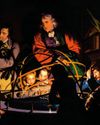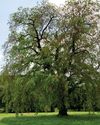
THE usually mild-mannered 18th-century curate Gilbert White suggested that house crickets ‘may be blasted and destroyed by gunpowder discharged into their crevices and crannies’ when they became ‘noisome pests’ in houses. If that sounds drastic, the author of The Natural History of Selborne had other remedies. ‘Cats catch hearth-crickets, and playing with them as they do with mice, devour them,’ he wrote. He also recommended setting down phials half-filled with beer or other liquids in their haunts ‘for, being always eager to drink, they will crowd in till the bottles are full’.
These days, however, the critters have a much more positive, albeit somewhat low, public profile. Although the Talking Cricket (renamed Jiminy in Walt Disney’s sanitised Hollywood cartoon) is killed by Pinocchio in Carlo Collodi’s original story of 1883, another specimen is the hero of Charles Dickens’s popular Christmas story, A Cricket on the Hearth. Drawing on the old tradition that, as Mrs Peerybingle declares, ‘to have a cricket on the hearth is the luckiest thing in the world!’, it brings comfort and reassurance to her humble dwelling ‘where its shrill, sharp, piercing voice resounds’ and seems ‘to twinkle though the outer darkness like a star’.
A few decades earlier, John Keats used the cricket as a symbol of ‘the poetry of the earth’ in his sonnet On the Grasshopper and Cricket (1817), its song ‘in warmth increasing ever’—a reminder that, in past times, when crickets were more numerous, their chirpings were regarded as a soundtrack of a long, hot English summer.
Diese Geschichte stammt aus der June 14, 2023-Ausgabe von Country Life UK.
Starten Sie Ihre 7-tägige kostenlose Testversion von Magzter GOLD, um auf Tausende kuratierte Premium-Storys sowie über 8.000 Zeitschriften und Zeitungen zuzugreifen.
Bereits Abonnent ? Anmelden
Diese Geschichte stammt aus der June 14, 2023-Ausgabe von Country Life UK.
Starten Sie Ihre 7-tägige kostenlose Testversion von Magzter GOLD, um auf Tausende kuratierte Premium-Storys sowie über 8.000 Zeitschriften und Zeitungen zuzugreifen.
Bereits Abonnent? Anmelden

A leap in the dark
The primal play of light and shadow, whether in Leonardo's ever-so-subtle sfumato or Caravaggio's dramatic contrasts, has shaped Western art, as Michael Hall reveals

Beauty and the blimp
Inflammable airships may be gone, but a new hybrid aircraft, capable of delivering eco-friendly aviation, is set to take to the skies with a bang, finds Charles Harris

Three wishes for food and farming
Royal hedge planting, the terrible toll on Ukrainian farming and a maiden speech

Seeing the wood for the trees
Scotland's much-evolved forestry industry has become a focus for clever investors

Let's fall in love
Birds do it, bees do it, even educated fleas do it. Laura Parker finds that, when it comes to creatures mating for life, persistence, patience and a little dad dancing are key to success

Back from the dead
THREE Wentworth elm saplings have been planted in the grounds of the Palace of Holyroodhouse, Edinburgh, and on the Highgrove estate in Gloucestershire-29 years after what was thought to be the lastknown Wentworth elm died.

A man among men
What makes a master? Beloved of the commercial art world, handled warily by art historians, the word has long been opaque. Michael Prodger investigates its many meanings-and discovers that being male confers an unfair advantage

Unearth one of life's luxuries
Black diamonds are a girl's best friend this Valentine's Day, with Périgord truffle-based skincare from TRUFFE

Adventure awaits
Spend an unforgettable family holiday on the Benmore Estate and experience some of Scotland's finest wildlife and sporting activities

Let the art rule the head
Despite being a world leader in everything from jewellery to fashion and music, the UK is failing to nurture creativity at school and in regional centres. Tristram Hunt, director of the V&A Museum, calls for an urgent review